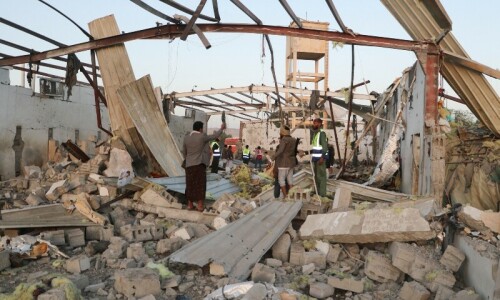PRIME Minister Imran Khan has announced that he has started a dialogue with the Taliban for the formation of a broad-based and inclusive government. This important statement came after his meeting with regional leaders at the Shanghai Cooperation Organisation summit held in Dushanbe, Tajikistan.
The Taliban government is yet to be recognised by any country and the major obstacle remains the Taliban’s refusal to accommodate other ethnicities as well as women in the newly formed set-up. Pakistan has maintained from the start that the Taliban must make the government a broad-based one if they want to become part of the international community. So far the Taliban remain unmoved.
This intransigence will have consequences. Afghanistan is facing a humanitarian crisis in the absence of any significant financial and technical assistance. The UN secretary general has warned of a severe impact on the people of Afghanistan if the international community does not provide relief and money on an urgent basis.
UN estimates predict that the country could be facing poverty rates upwards of 90pc by next year if swift measures are not taken to alleviate the situation. The UN chief has also urged the world to delink humanitarian assistance from the issue of recognition of the Taliban government so that aid and assistance can be dispatched without delay.
Mr Khan has said correctly that the world has two choices with Afghanistan — either engage with it or abandon it. We have seen in the past how abandoning the country led to the rise of terrorist groups with disastrous consequences for everyone. Therefore engagement is the only real option. A lot will of course depend on how the Taliban behave and govern. If they continue with their exclusionary approach, it would become very difficult for the world to engage with them. They must listen to reason, and change accordingly. If they do not, their government will find it very hard to remain sustainable. The ensuing crisis could lead to a fresh wave of instability that could, among other things, trigger a greater exodus of refugees into Pakistan. The head of the UN refugee agency has urged Pakistan to accept refugees if such a situation arises but he should also realise that this is a burden that Pakistan has been shouldering for decades. It is very hard to do this now without the help of other countries. It is unfair to expect that Pakistan will bear the financial, political and social cost of more refugees knowing that it has paid a steep price for doing so in the past.
To avert such a crisis in Afghanistan, the international community has to move decisively to help the people of the country. Pakistan has played an effective role in coordinating the efforts of regional countries to deal with the challenges emerging from the unstable situation in Afghanistan. The prime minister’s latest initiative is a welcome one.
Published in Dawn, September 19th, 2021














































